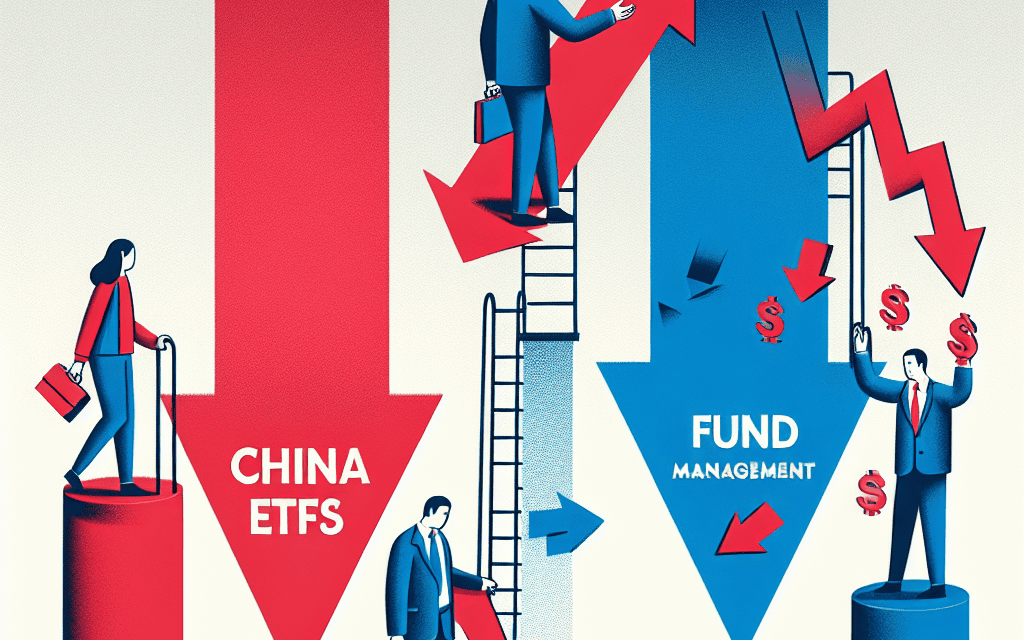“Market Shifts: China ETFs and Cathie Wood’s Funds at the Forefront of US Wealth Decline”
Introduction
China ETFs, or exchange-traded funds, are investment funds traded on stock exchanges, much like stocks, that primarily focus on Chinese markets or companies. These funds provide investors with a diversified exposure to China’s economic growth and market dynamics, allowing them to invest in a broad range of sectors within the Chinese economy. However, recent geopolitical tensions, regulatory crackdowns, and economic challenges have led to increased volatility and risk in these investments, impacting their performance and investor sentiment.
Meanwhile, Cathie Wood’s funds, particularly those managed by ARK Investment Management, have experienced a significant decline in wealth. Known for their focus on disruptive innovation and high-growth technology sectors, these funds saw substantial gains during the tech boom. However, recent market corrections, rising interest rates, and a shift in investor sentiment towards more stable and value-oriented investments have led to a sharp decrease in their valuations. This decline highlights the challenges faced by growth-focused investment strategies in a changing economic landscape.
Impact Of China ETFs On Global Markets
In recent years, the global financial landscape has been significantly influenced by the performance of China-focused Exchange Traded Funds (ETFs) and the investment strategies of prominent fund managers like Cathie Wood. As these financial instruments and strategies have gained traction, their impact on global markets has become increasingly pronounced. The decline in wealth associated with China ETFs and Cathie Wood’s funds has raised concerns among investors and analysts alike, prompting a closer examination of the underlying factors contributing to this trend.
China ETFs, which are designed to track the performance of Chinese equities, have experienced substantial volatility due to a myriad of economic and geopolitical factors. The Chinese economy, being one of the largest in the world, plays a pivotal role in global trade and investment. However, recent regulatory crackdowns by the Chinese government on sectors such as technology, education, and real estate have led to significant market disruptions. These regulatory measures, aimed at curbing monopolistic practices and ensuring data security, have resulted in a sharp decline in the stock prices of major Chinese companies. Consequently, China ETFs, which are heavily weighted towards these sectors, have seen a corresponding decrease in value.
Moreover, the ongoing trade tensions between China and the United States have further exacerbated the situation. Tariffs and trade barriers have created an uncertain environment for investors, leading to increased market volatility. This uncertainty has been reflected in the performance of China ETFs, which have struggled to maintain stability amidst fluctuating market conditions. As a result, investors who have allocated a significant portion of their portfolios to these ETFs have experienced notable declines in their wealth.
Simultaneously, Cathie Wood’s funds, particularly those managed under ARK Investment Management, have also faced challenges. Known for her aggressive investment strategy focused on disruptive innovation, Wood’s funds have been heavily invested in high-growth sectors such as technology and biotechnology. While this approach yielded impressive returns during periods of market optimism, it has also exposed the funds to heightened risk during times of market correction. The recent downturn in technology stocks, driven by factors such as rising interest rates and supply chain disruptions, has adversely affected the performance of Wood’s funds.
Furthermore, the interconnectedness of global markets means that the decline in China ETFs and Cathie Wood’s funds has had a ripple effect on other financial markets. Investors, seeking to mitigate losses, have reallocated their assets, leading to shifts in capital flows across different regions and sectors. This reallocation has contributed to increased volatility in global markets, as investors reassess their risk exposure and investment strategies.
In conclusion, the decline in wealth associated with China ETFs and Cathie Wood’s funds underscores the complex interplay of economic, geopolitical, and market dynamics. As investors navigate this challenging landscape, it is crucial to remain informed about the factors influencing these financial instruments and to adopt a diversified investment approach. By understanding the broader implications of these trends, investors can better position themselves to weather the uncertainties of the global financial markets. As the situation continues to evolve, ongoing analysis and adaptation will be essential for managing risk and optimizing returns in an increasingly interconnected world.
Cathie Wood’s Investment Strategies And Their Recent Performance
Cathie Wood, the renowned founder and CEO of ARK Investment Management, has long been celebrated for her bold investment strategies and her focus on disruptive innovation. Her funds, particularly the ARK Innovation ETF, have attracted significant attention and investment due to their impressive performance in previous years. However, recent market dynamics have posed challenges to her investment strategies, leading to a notable decline in the wealth of her funds. This decline is not isolated to Wood’s funds alone; it is part of a broader trend affecting various investment vehicles, including China-focused ETFs, which have also experienced substantial downturns.
To understand the recent performance of Cathie Wood’s funds, it is essential to consider the broader economic and geopolitical context. The global market has been characterized by heightened volatility, driven by factors such as inflationary pressures, interest rate hikes, and geopolitical tensions. These elements have created an environment of uncertainty, prompting investors to reassess their risk appetites and investment strategies. In this climate, growth-oriented funds like those managed by Wood have faced significant headwinds. The focus on high-growth, high-risk sectors such as technology and biotechnology, which once propelled her funds to remarkable heights, has now become a double-edged sword.
Moreover, the regulatory landscape has also played a crucial role in shaping the performance of these funds. In particular, increased scrutiny and regulatory actions in China have had a profound impact on China-focused ETFs. The Chinese government’s crackdown on technology companies and other sectors has led to a sharp decline in the value of these investments. This regulatory uncertainty has not only affected China ETFs but has also had ripple effects on global markets, contributing to the overall decline in wealth observed in various investment portfolios, including those managed by Cathie Wood.
Transitioning to the specific strategies employed by Wood, it is evident that her approach is heavily reliant on identifying and investing in companies that are at the forefront of innovation. While this strategy has yielded substantial returns in the past, it is inherently susceptible to market fluctuations and changes in investor sentiment. The recent shift towards value-oriented investments, driven by concerns over inflation and interest rates, has further exacerbated the challenges faced by growth-focused funds. As investors seek safer havens, the appeal of high-risk, high-reward investments diminishes, leading to outflows from funds like those managed by ARK.
Despite these challenges, it is important to recognize that Cathie Wood remains committed to her investment philosophy. Her conviction in the transformative potential of disruptive technologies continues to guide her investment decisions. However, the current market environment necessitates a reevaluation of strategies and a potential recalibration of portfolios to align with evolving market conditions. This may involve a more cautious approach, balancing the pursuit of innovation with a consideration of risk management.
In conclusion, the recent decline in the wealth of Cathie Wood’s funds and China ETFs underscores the complex interplay of economic, geopolitical, and regulatory factors influencing global markets. While Wood’s investment strategies have faced significant challenges, they remain rooted in a long-term vision of innovation and disruption. As the market landscape continues to evolve, the ability to adapt and navigate these changes will be crucial for investors seeking to capitalize on future opportunities while mitigating risks.
Analyzing The Wealth Decline In US ETFs
In recent years, the landscape of exchange-traded funds (ETFs) in the United States has experienced significant shifts, with particular attention drawn to the performance of China-focused ETFs and those managed by Cathie Wood’s ARK Investment Management. These funds, once heralded for their robust returns and innovative investment strategies, have recently faced challenges that have contributed to a broader decline in wealth within the US ETF market. Understanding the factors behind this downturn requires a closer examination of both the macroeconomic environment and the specific dynamics affecting these funds.
To begin with, China ETFs have been significantly impacted by the evolving economic and regulatory landscape in China. As the world’s second-largest economy, China’s growth trajectory has been a focal point for global investors. However, recent regulatory crackdowns on technology companies, coupled with concerns over real estate debt and slowing economic growth, have led to increased volatility in Chinese markets. This uncertainty has, in turn, affected the performance of China-focused ETFs, which are heavily reliant on the stability and growth of Chinese equities. As investors reassess their exposure to China, these ETFs have seen substantial outflows, contributing to the overall decline in wealth within the US ETF sector.
Simultaneously, Cathie Wood’s ARK funds, known for their aggressive bets on disruptive technologies and innovation-driven companies, have also faced headwinds. Initially, these funds garnered significant attention and capital inflows due to their impressive returns and forward-thinking investment philosophy. However, the recent market environment, characterized by rising interest rates and a shift towards value-oriented investments, has posed challenges for growth-focused strategies. As a result, ARK’s flagship funds have experienced notable declines in performance, leading to a reevaluation of their positions by investors. This shift in sentiment has further exacerbated the wealth decline in the US ETF market.
Moreover, the broader economic context cannot be overlooked when analyzing the decline in wealth within US ETFs. The global economy has been navigating a complex landscape marked by inflationary pressures, supply chain disruptions, and geopolitical tensions. These factors have contributed to heightened market volatility and a reevaluation of risk by investors. In such an environment, ETFs, which are often seen as a barometer of investor sentiment, have been particularly sensitive to shifts in market dynamics. The interplay between macroeconomic factors and specific fund performance has created a challenging environment for ETF investors, leading to a contraction in wealth.
In addition to these factors, investor behavior has also played a crucial role in the wealth decline observed in US ETFs. As market conditions have become more uncertain, there has been a noticeable shift towards more conservative investment strategies. Investors are increasingly prioritizing capital preservation over high-risk, high-reward opportunities, leading to a reallocation of assets away from growth-oriented funds like those managed by Cathie Wood. This trend has further contributed to the outflows from these funds and the subsequent decline in their asset values.
In conclusion, the wealth decline in US ETFs, particularly those focused on China and managed by Cathie Wood, can be attributed to a confluence of factors. The regulatory and economic challenges facing China, the shifting market environment impacting growth strategies, and broader macroeconomic uncertainties have all played a role in shaping investor sentiment and behavior. As the global economic landscape continues to evolve, the performance of these funds will likely remain a focal point for investors seeking to navigate the complexities of the modern financial markets.
The Role Of China ETFs In Diversifying Portfolios

In recent years, the global investment landscape has witnessed significant shifts, with China Exchange-Traded Funds (ETFs) playing a pivotal role in diversifying portfolios. However, the recent downturn in these funds, alongside the performance of Cathie Wood’s ARK Investment Management, has led to a notable decline in wealth for many U.S. investors. Understanding the dynamics of China ETFs and their impact on portfolio diversification is crucial for investors seeking to navigate these turbulent times.
China ETFs have long been considered a strategic component for diversifying investment portfolios due to their exposure to one of the world’s largest and fastest-growing economies. These funds offer investors access to a wide array of Chinese companies across various sectors, including technology, consumer goods, and manufacturing. By investing in China ETFs, U.S. investors can potentially benefit from China’s economic growth, which has historically outpaced that of many Western countries. Moreover, these funds provide a hedge against domestic market volatility, as they are influenced by different economic and geopolitical factors.
However, the recent performance of China ETFs has been less than stellar, contributing to a decline in wealth for U.S. investors. Several factors have contributed to this downturn, including regulatory crackdowns by the Chinese government on key sectors such as technology and education. These crackdowns have led to increased uncertainty and volatility in Chinese markets, causing many China ETFs to underperform. Additionally, geopolitical tensions between the U.S. and China have further exacerbated investor concerns, leading to capital outflows from these funds.
Simultaneously, Cathie Wood’s ARK Investment Management, known for its focus on disruptive innovation and high-growth technology stocks, has also experienced a decline in performance. Wood’s funds, which gained immense popularity during the tech boom, have faced challenges as market conditions shifted. Rising interest rates and inflationary pressures have led to a rotation away from high-growth stocks, impacting the performance of ARK’s flagship funds. This shift has been compounded by the underperformance of key holdings in the technology sector, further contributing to the decline in wealth for investors.
The simultaneous decline in China ETFs and Cathie Wood’s funds highlights the importance of diversification and risk management in investment portfolios. While China ETFs offer exposure to a rapidly growing economy, they also come with inherent risks associated with regulatory changes and geopolitical tensions. Similarly, investing in high-growth technology stocks can yield substantial returns but also carries significant volatility, especially in changing economic environments.
For investors seeking to navigate these challenges, it is essential to adopt a balanced approach to portfolio diversification. This involves not only investing in a mix of asset classes and geographic regions but also considering the potential risks and rewards associated with each investment. By doing so, investors can better position themselves to weather market fluctuations and achieve long-term financial goals.
In conclusion, while China ETFs and Cathie Wood’s funds have led to a decline in wealth for many U.S. investors, they also underscore the importance of diversification and risk management. As the global investment landscape continues to evolve, investors must remain vigilant and adaptable, ensuring that their portfolios are well-diversified and aligned with their risk tolerance and investment objectives. By doing so, they can better navigate the complexities of the market and capitalize on opportunities for growth.
Cathie Wood’s Funds: A Deep Dive Into Their Holdings
Cathie Wood’s funds, particularly those managed under ARK Investment Management, have been at the forefront of innovation-focused investing, capturing the attention of both retail and institutional investors. However, recent market dynamics have led to a notable decline in the wealth associated with these funds, with China ETFs playing a significant role in this downturn. To understand the intricacies of this decline, it is essential to delve into the holdings of Cathie Wood’s funds and examine how their composition and strategy have been impacted by broader economic trends.
ARK Investment Management is renowned for its thematic investment approach, focusing on disruptive innovation across sectors such as technology, genomics, and fintech. The flagship ARK Innovation ETF (ARKK) is a prime example, with significant allocations in companies like Tesla, Roku, and Zoom. These companies have been at the cutting edge of technological advancement, driving substantial returns during periods of market optimism. However, the volatility inherent in such high-growth stocks has also exposed the fund to significant risks, particularly in times of market correction or economic uncertainty.
In recent months, the performance of Cathie Wood’s funds has been adversely affected by several factors. One of the most prominent is the regulatory and economic challenges facing Chinese companies, which have been a substantial component of global ETFs. The Chinese government’s crackdown on technology firms and other sectors has led to a sharp decline in the value of Chinese equities, which in turn has impacted ETFs with significant exposure to these markets. As a result, funds like ARKK, which may have indirect exposure through global tech supply chains or partnerships, have felt the ripple effects of this downturn.
Moreover, the broader market sentiment has shifted towards a more risk-averse stance, with investors increasingly wary of high-valuation stocks. This shift has been exacerbated by rising interest rates and inflationary pressures, which tend to negatively impact growth-oriented investments. Cathie Wood’s funds, with their focus on future potential rather than current profitability, have been particularly vulnerable to this change in investor sentiment. The resulting sell-off in high-growth stocks has contributed to the decline in the wealth associated with these funds.
Despite these challenges, it is important to recognize the long-term vision that underpins Cathie Wood’s investment strategy. The focus on disruptive innovation is predicated on the belief that technological advancements will continue to reshape industries and create new opportunities for growth. While short-term market fluctuations can be unsettling, the potential for significant returns remains if these innovations come to fruition as anticipated.
In conclusion, the decline in wealth associated with Cathie Wood’s funds can be attributed to a confluence of factors, including the regulatory environment in China, shifts in market sentiment, and macroeconomic pressures. While these challenges have undoubtedly impacted the performance of these funds, the underlying investment philosophy remains centered on the transformative potential of innovation. As the market continues to evolve, investors will be closely watching how Cathie Wood’s funds navigate these complexities and whether their long-term vision will ultimately yield the anticipated rewards.
Comparing China ETFs And US-Based ETFs
In recent years, the global investment landscape has witnessed significant shifts, with China ETFs and Cathie Wood’s funds emerging as notable players. However, these investment vehicles have also been at the forefront of a wealth decline in the United States, prompting investors to reassess their strategies. To understand this phenomenon, it is essential to compare China ETFs with US-based ETFs, examining their performance, underlying factors, and broader implications for investors.
China ETFs, which are exchange-traded funds that focus on Chinese equities, have gained popularity due to China’s rapid economic growth and its increasing influence on the global stage. These funds offer investors exposure to a diverse range of sectors within the Chinese economy, from technology to consumer goods. However, recent geopolitical tensions, regulatory crackdowns, and economic uncertainties have led to volatility in Chinese markets. Consequently, China ETFs have experienced significant fluctuations, impacting their overall performance and contributing to the wealth decline observed among US investors.
In contrast, US-based ETFs have traditionally been seen as a more stable investment option, given the relative maturity and stability of the US economy. These funds encompass a wide array of sectors and industries, providing investors with diversified exposure to the American market. However, even US-based ETFs have not been immune to recent market challenges. Factors such as inflationary pressures, interest rate hikes, and supply chain disruptions have weighed on the performance of these funds, albeit to a lesser extent than their Chinese counterparts.
Cathie Wood’s funds, particularly those managed by ARK Invest, have also played a significant role in the wealth decline narrative. Known for their focus on disruptive innovation and high-growth sectors, these funds have attracted substantial attention and capital. Yet, the inherent volatility associated with investing in emerging technologies and speculative ventures has led to periods of underperformance. As market conditions have shifted, the aggressive investment strategies employed by Wood’s funds have faced scrutiny, resulting in notable declines in their value.
The wealth decline observed in the US can be attributed to a confluence of factors affecting both China ETFs and US-based ETFs. For China ETFs, the regulatory environment in China has become increasingly unpredictable, with crackdowns on technology companies and other sectors creating uncertainty for investors. This has led to a reassessment of risk and a subsequent decline in investor confidence. Meanwhile, US-based ETFs have been impacted by macroeconomic factors such as inflation and interest rate changes, which have influenced market sentiment and investment decisions.
Despite these challenges, it is important to recognize that both China ETFs and US-based ETFs continue to offer potential opportunities for investors. For those with a long-term perspective, the growth prospects of the Chinese economy and the resilience of the US market remain compelling. Diversification across different regions and sectors can help mitigate risks and enhance returns over time.
In conclusion, the wealth decline in the US, led by China ETFs and Cathie Wood’s funds, underscores the complexities of the current investment landscape. By comparing these investment vehicles, it becomes evident that a combination of geopolitical, economic, and market-specific factors has contributed to recent challenges. As investors navigate this evolving environment, a balanced approach that considers both risks and opportunities will be crucial in achieving sustainable wealth growth.
Future Outlook For Cathie Wood’s Investment Funds
The recent downturn in the performance of China-focused exchange-traded funds (ETFs) and Cathie Wood’s investment funds has sparked considerable discussion among investors and analysts alike. As these funds have been significant players in the market, their decline has raised questions about their future prospects and the broader implications for the investment landscape. To understand the future outlook for Cathie Wood’s investment funds, it is essential to consider the factors contributing to their recent performance and the strategies that may influence their trajectory moving forward.
Cathie Wood, the founder of ARK Investment Management, has been renowned for her bold investment strategies, particularly her focus on disruptive innovation and technology-driven companies. Her funds, which include ARK Innovation ETF (ARKK), have attracted significant attention and capital due to their impressive returns in previous years. However, the recent decline in these funds can be attributed to several factors, including market volatility, regulatory challenges, and shifts in investor sentiment.
One of the primary factors affecting Cathie Wood’s funds is the broader market volatility, which has been exacerbated by geopolitical tensions, inflationary pressures, and concerns over interest rate hikes. These macroeconomic factors have led to a more cautious approach among investors, who are increasingly seeking stability and value over high-growth, high-risk investments. Consequently, funds that focus on disruptive technologies, which are inherently more volatile, have experienced a decline in performance.
Moreover, regulatory challenges, particularly those emanating from China, have also played a significant role in the decline of China-focused ETFs and, by extension, Cathie Wood’s funds. The Chinese government’s crackdown on technology companies and other sectors has created uncertainty and risk, leading to a reevaluation of investments in these areas. As a result, funds with significant exposure to Chinese companies have faced headwinds, impacting their overall performance.
In addition to these external factors, shifts in investor sentiment have also influenced the outlook for Cathie Wood’s funds. As the market environment becomes more uncertain, investors are increasingly prioritizing value and stability over growth and innovation. This shift has led to a reallocation of capital away from high-growth funds, such as those managed by Cathie Wood, towards more traditional investment vehicles.
Despite these challenges, the future outlook for Cathie Wood’s investment funds is not entirely bleak. The focus on disruptive innovation remains a compelling long-term investment thesis, particularly as technological advancements continue to reshape industries and create new opportunities. Cathie Wood’s commitment to identifying and investing in transformative technologies could position her funds for a rebound as market conditions stabilize and investor confidence returns.
Furthermore, Cathie Wood’s active management style and willingness to adapt her strategies in response to changing market dynamics may also play a crucial role in the future performance of her funds. By continuously evaluating and adjusting her investment approach, she can potentially mitigate risks and capitalize on emerging opportunities, thereby enhancing the resilience and growth potential of her funds.
In conclusion, while the recent decline in China ETFs and Cathie Wood’s investment funds has raised concerns, the future outlook remains cautiously optimistic. By navigating the current challenges and leveraging her expertise in disruptive innovation, Cathie Wood has the potential to guide her funds towards renewed growth and success. As the investment landscape continues to evolve, her ability to adapt and innovate will be key determinants of her funds’ future performance.
Q&A
1. **What are China ETFs?**
China ETFs (Exchange-Traded Funds) are investment funds traded on stock exchanges, designed to track the performance of a specific index or basket of assets related to China, such as Chinese stocks or bonds.
2. **Why have China ETFs been declining?**
China ETFs have been declining due to various factors, including economic slowdown in China, regulatory crackdowns on key sectors, geopolitical tensions, and concerns over property market instability.
3. **Who is Cathie Wood?**
Cathie Wood is the founder and CEO of ARK Invest, an investment management firm known for its focus on disruptive innovation and technology-driven growth sectors.
4. **What are Cathie Wood’s funds?**
Cathie Wood’s funds, primarily under ARK Invest, include actively managed ETFs that invest in sectors like genomics, fintech, robotics, artificial intelligence, and other innovative technologies.
5. **Why have Cathie Wood’s funds led to wealth decline in the US?**
Cathie Wood’s funds have led to wealth decline due to significant volatility and underperformance in the technology and innovation sectors, which have been impacted by rising interest rates, inflation concerns, and market corrections.
6. **How have global economic conditions affected China ETFs and Cathie Wood’s funds?**
Global economic conditions, such as supply chain disruptions, inflation, and monetary policy shifts, have contributed to market volatility, affecting both China ETFs and Cathie Wood’s funds by increasing uncertainty and risk aversion among investors.
7. **What is the outlook for China ETFs and Cathie Wood’s funds?**
The outlook for China ETFs and Cathie Wood’s funds remains uncertain, with potential recovery dependent on stabilization in China’s economy, easing of regulatory pressures, and a rebound in technology and innovation sectors as global economic conditions improve.
Conclusion
China ETFs and Cathie Wood’s funds have experienced significant wealth declines in the US due to a combination of factors. For China ETFs, the downturn can be attributed to regulatory crackdowns, geopolitical tensions, and economic challenges within China, which have led to decreased investor confidence and capital outflows. Meanwhile, Cathie Wood’s funds, particularly those focused on disruptive innovation and technology, have faced setbacks due to rising interest rates, market volatility, and a shift in investor sentiment away from high-growth, high-risk assets. Together, these elements have contributed to a notable reduction in the wealth associated with these investment vehicles, highlighting the impact of macroeconomic and geopolitical factors on investment performance.





